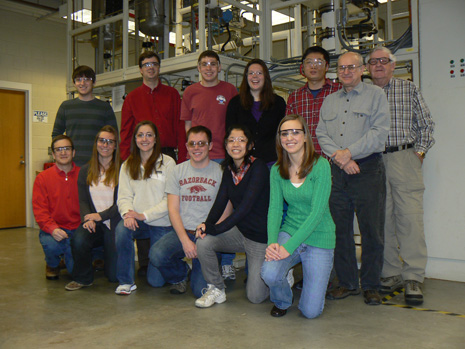
FAYETTEVILLE, Ark. – Jamie Hestekin and his team of undergraduate engineering students have won Planet Forward’s Innovator of the Year contest. As one of two Innovators of the Year, Hestekin and his team will be featured on Planet Forward’s website and television special for the next 12 months, as they work on a method of producing biofuel from algae.
“The College of Engineering is very proud of Dr. Hestekin and his students,” said Dean Ashok Saxena. “They are conducting important research, and on top of that, these students are getting the valuable experience of a hands-on education. We’re also very excited that Planet Forward has given us this opportunity to help promote engineering research and alternative energy, two very relevant topics in the world today.”
Planet Forward, a project of the Center for Innovative Media at George Washington University, features ideas about energy, climate and sustainability on its website and through television specials, which air on public television stations across the country.
The University of Arkansas project focuses on using algae to produce biofuels such as butanol. Algae, which grow quickly in streams and ponds, can be used to remove pollutants such as nitrogen and phosphorus from the water and then be harvested to make cleaner-burning biofuel. In addition, the leftover plant material can be used as fertilizer.
Led by Hestekin and co-advisers Bob Beitle and Roy Penney, the students are working on a biofuel miniprocessing unit, a machine that can turn algae and other biomass directly into fuel. Their device, which is small enough to fit in the back of a pickup truck and produces a few milliliters of fuel-grade butanol at a time, could serve as a model for larger applications of this technology. For example, a larger machine based on this model could be used by farmers to turn plants directly into fuel for farm equipment.
Fifteen students are taking part in this project, including undergraduates Elizabeth Bevan, Ethan Carter, Danielle Frechette, Megan Huslig, Jill Ivey, Alex Lopez, Ali McAtee, Kelly Meek, Hiroko Nakao, Kylan Rakestraw, Lizbeth Rostro, Michelle Shepherd and Jeremy Stout. Two doctoral students, Jianjun Du and Tom Potts, are also involved. Eight of the undergraduate students plan to incorporate the project into their honors theses, and Kelly Meek and Ali McAtee have received a grant from the Honors College to support their work with this project.
Topics
Contacts
Jamie Hestekin, assistant professor of chemical engineering
College of Engineering
479-575-3492,
Camilla Shumaker, director of science and research communications
University Relations
479-575-7422,